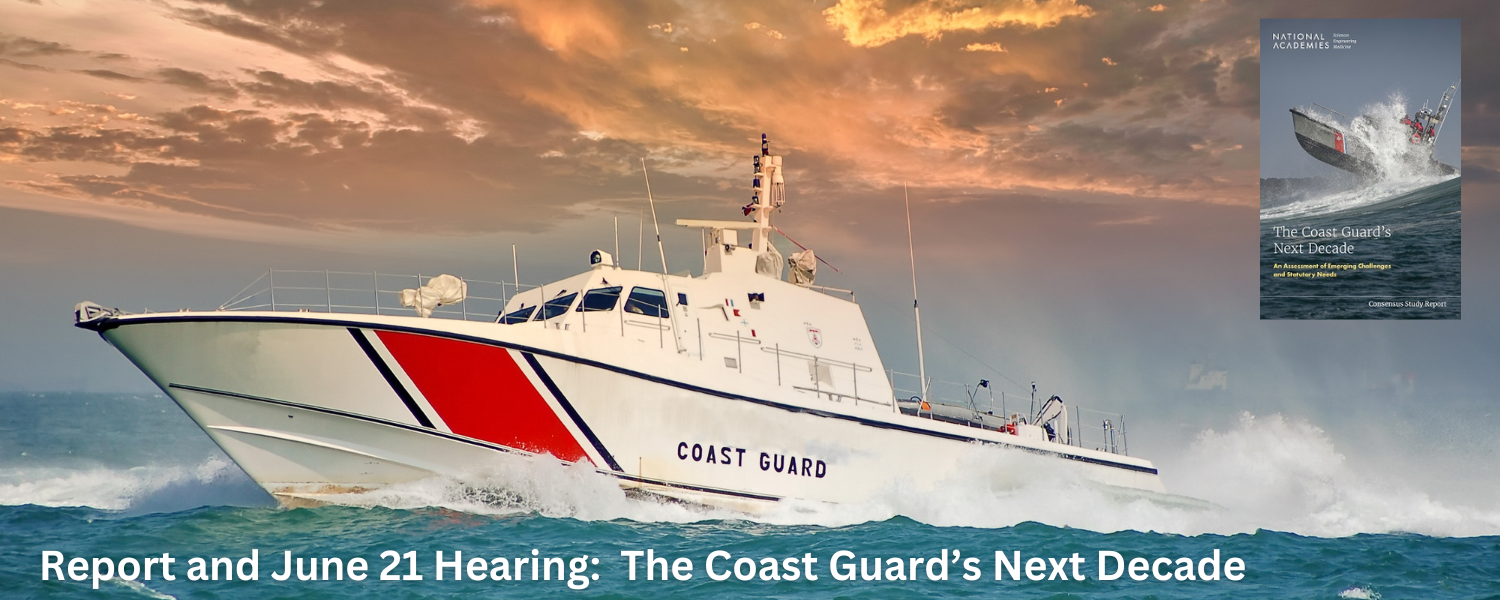The U.S. House of Representatives’ Coast Guard and Maritime Transportation Subcommittee will hold a hearing on Wednesday, June 21, 2023 to assess the future challenges and needs of the U.S. Coast Guard.
Entitled “Review of the National Academy of Sciences Report ‘The Coast Guard’s Next Decade: An Assessment of Emerging Challenges and Statutory Needs’,” the 10 a.m. (ET) hearing will review the newly published report, which discusses a range of emerging challenges for the U.S. Coast Guard over the coming years, including ones driven by climate change, technology and innovation, and global strategic competition.
To read the complete report, click here or download it as a PDF from the National Academy of Sciences, Engineering and Medicine here.
The January 21 Subcommittee hearing includes the following witness testimony from
- Admiral Steve Poulin, Vice Commandant, United States Coast Guard
- Cary Coglianese, Ph.D., Chair, Committee for a Study on New Coast Guard Authorities, National Academy of Sciences
- Heather MacLeod, Director, Homeland Security and Justice, United States Government Accountability Office
More information about the hearing, including links to witness testimony and a link to the live webcast can be accessed here.
Requested by Congress in P.L. 116-283, the William M. (Mac) Thornberry National Defense Authorization Act for Fiscal Year 2021, the report identifies emerging issues affecting the U.S. maritime domain that are likely to demand Coast Guard “oversight, regulation, or action” over the next decade. It then assesses whether the Coast Guard may need any adjustments or additions to its statutory authority to be able to address the identified issues.
To identify foreseeable developments, as well as to identify likely actions needed in response and to assess the adequacy of the Coast Guard’s existing statutory authority, the study committee consulted widely with leaders of the Coast Guard, individuals from outside the Coast Guard with broad maritime domain experience, and experts in a range of relevant technical fields.
Drawing on these consultations and committee members’ own expert judgment, the committee identified the following 10 issue areas or developments that will confront the Coast Guard over the next decade:
- autonomous systems;
- cybersecurity risk;
- commercial spaceflight operations;
- offshore wind energy;
- aquaculture;
- the Arctic domain;
- ship decarbonization;
- disasters;
- migration; and
- illegal, unreported, and unregulated (IUU) fishing.
About the Coast Guard
One of the United States’ six armed forces, the U.S. Coast Guard carries out many important military and civilian missions as an emergency responder, law enforcement agency, member of the intelligence community, manager of the navigable waterways, protector of maritime safety and security, and steward of the marine environment.
To fulfill its many functions, the Coast Guard must be able to anticipate, prepare for, and meet a host of new and changing demands across a vast and increasingly varied maritime domain in a manner that is increasingly agile, adaptive and digitally adept.
About the Subcommittee on Coast Guard and Maritime Transportation
The Subcommittee on Coast Guard and Maritime Transportation conducts oversight of the U.S. Coast Guard, the Service responsible for enforcing the Nation’s laws on waters under U.S. jurisdiction and on the high seas. The Coast Guards many missions include search and rescue, illegal drug and migrant interdiction, oil spill prevention and response, maritime safety and security, maintaining aids to navigation, icebreaking, and enforcement of U.S. fisheries and marine pollution laws.
The Subcommittee also has jurisdiction over regulation of ocean shipping and the merchant marine, except as it relates to national security.
One of the Subcommittee’s regular priorities is legislation to authorize the Coast Guard’s programs and to support and strengthen the important missions of one of the Nation’s five armed services.
Issues and agencies under the jurisdiction of the Coast Guard and Maritime Transportation Subcommittee include:
|
|
